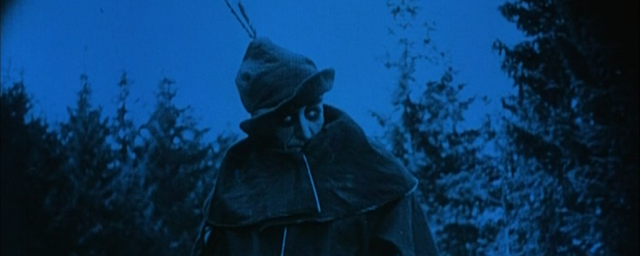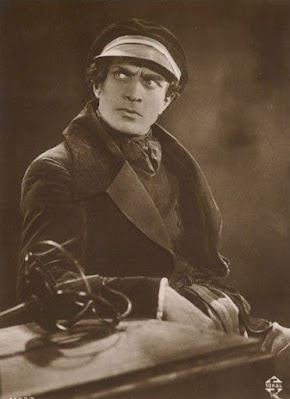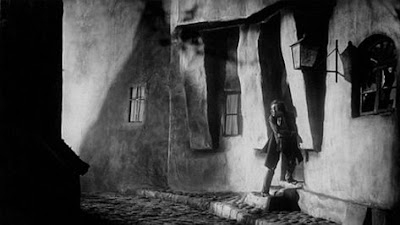Sunday, October 31, 2021
Saturday, October 30, 2021
Friday, October 29, 2021
Spooktober 29: Alraune [A Daughter of Destiny] (1928)
One of the last great silent horror films before the coming of sound Alraune was also one of the last silent films in the Frankenstein story vein, Alraune (also known in English by the title A Daughter of Destiny) was released in Germany at the beginning of 1928 and in the U.S. later that spring. Despite it's clear influence from and general association with the Mary Shelley novel, the core story, and, indeed, the title itself come from an entirely different novel altogether. The novel Alraune (translation "mandrake" hence the tangled roots prominently featured in several posters) by Hanns Heinz Ewers was published in 1911 as a fully illustrated affair and was based on a German fold tale that dates from the Middle Ages (and I cannot help but mention the anti-Semitic nature of several of the illustrations in that novel despite that it's author claimed not to be an avowed anti-Semite later when he became involved with National Socialism [only to be quickly ostracized and banned], something that is conspicuously absent in the film). Though the novel draws from the folk tale, it updates it into a horrific scientific setting that was clearly a nod at least (if not an out-and-out rip off) of the Frankenstein story published nearly a hundred years before it. The film further draws from the Shelley invention in the form of a mad scientist like professor played by Paul Wegener. The story then hews much closer to the old belief that mandrakes, which were thought to be the spawn of hanged men, where used by witches to bear soulless children. In the film an experiment is performed by the professor on a prostitute using the same belief, the result is the unnatural offspring Alraune. Brigitte Helm, famous for her starring role in Metropolis, plays the female monster, who grows to adulthood in an unnaturally short period of time and shows all the the signs of being a soulless woman corrupted not just by an unnatural birth, but also by her adoption by the professor, who is playing in God's own arena. To contrast her willingness to engage in shocking behaviors, the story has her sent off to a convent, where things...well let's just say...don't go well for the nuns there. Though the film has very creepy imagery, there is very little straight out horror in it. It is, instead, a kind of morality tale that cautions against the evils of drink, gambling and other vices of "low living." The director was Henrick Galeen, and his is considered the most sexually explicit to date of the handful of adaptations of the Ewers novel (as the first poster above attests), and firmly ensconces Helm into the ranks of the "vamp" (as was made so wildly popular int he 1910's by Fox's Theda Bara). It also thoroughly and successfully turns an old supernatural folk tale into a work of solid science fiction. Helm would replay the role again in 1930 in a sound version directed by Richard Oswald (see the middle poster above). Galeen's Alraune has been compared to some of the best German Expresionist films of the decade, including The Cabinet of Dr. Caligari and Nosferatu.
Thursday, October 28, 2021
Spooktober 28: The Terror (1928)
Warner Brother's The Terror is without a doubt the world's very first "all talking" horror feature film; released in 1928 when most theaters were in no way equipped for sound (even synchronized sound from disc as was the case here). As a result, this widely distributed crime thriller based on an Edgar Wallace play was also, and primarily, released as a silent film. Warners gave the film two separate release/premiere dates, with the sound version premiering a month and a half before the silent version. Directed by Roy Del Ruth, it starred May McAvoy and Edward Everett Horton, with the sound version utilizing the clunky Vitaphone on disc sound system, and the discs are the only portion of the film known to survive, despite it's wide distribution. UCLA's Film and Television Archive houses the only known copies of said discs that are thought to be in relatively good condition, though they do not seem to have been restored and released (UCLA is also rumored to have a copy of the print in some condition...though the condition of the print, if it exists at all, is not known). There are plenty of stills and lobby cards that do still exist and give a general idea of the creepy nature of the film. Basically an "old dark house" affair (of which Wallace excelled), the film was quite similar in story to other crime horrors of the 1920's such as The Bat and The Cat and the Canary, with the notable exception of the inclusion of a creepy old organ--making it the source of the old haunted house film trope of adding organ music adding to the scary ambience of the whole.
Wednesday, October 27, 2021
Spooktaober 27: The Head of Janus (1920)
I know... this is two Conrad Veidt films in as many days, but this lost gem is so much more. It has connections to so many other really famous horror and near horror films (Karl Freund was the chief cinematographer), many of them amongst the most well known silents films out there. The most recognizable connection is that it's a Murnau film from 1920. Murnau needs no introduction; he was famous in his native Germany and later in his adopted United States. Veidt would follow a similar path, via the U.K. But, it is yet another player in this silent German adaptation of Stevenson's Jekyll And Hyde, who became a much bigger fixture the American psyche than Veidt or Murnau combined who is of interest here: Bela Lugosi. Lugosi who was famously Hungarian, born in what is now Romania and a World War I veteran, made his way to Germany after the war (he had already appeared in a Hungarian production directed by future Casablanca director Michael Curtiz), where he appeared in a handful of films, including this one. The film is lost, but stills do survive. We are fortunate that one of them contains Lugosi in his role as Dr. Warren's Diener.
Tuesday, October 26, 2021
Spooktober 26: Der Student von Prag (1926)
Monday, October 25, 2021
Spooktober 25: The Magician (1926)
Celebrating 95 years of Rex Ingram's The Magician, a 1926 MGM release!
[note: I had planned a much more fleshed out post for this, but I simply cannot get blogger to cooperate. It pains me, it really does, this used to be such a user friendly platform for us blogging non-professional types. 😖]


























































